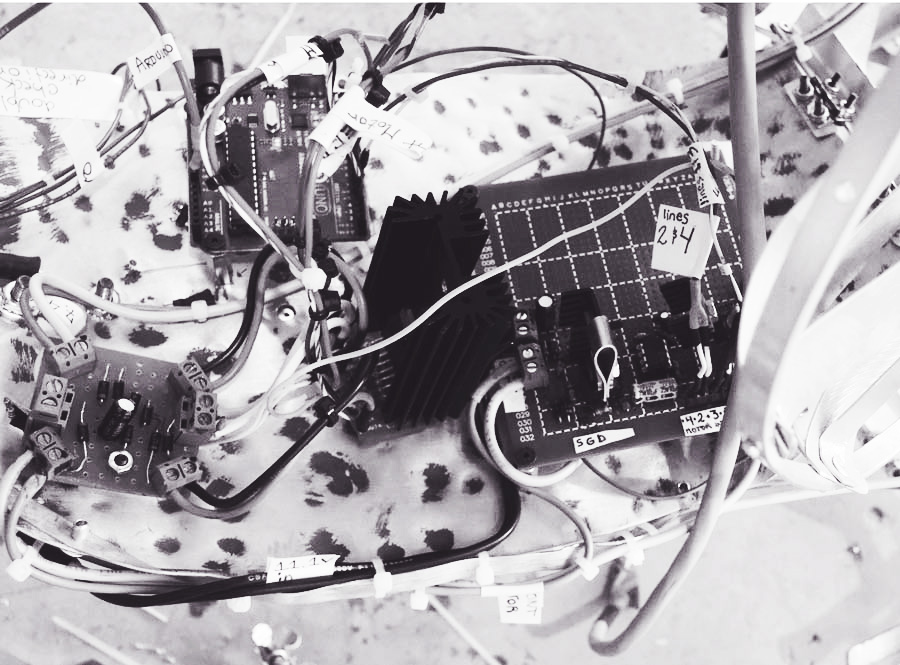 My grandfather, a Universidad Técnica mathematics professor, later also tutored rich dumb children in a small room with a blackboard at the back of the house. Before I even learned how to read and write I would peek during his lessons watching him scribble symbols on the blackboard in dazed fascination.
My grandfather, a Universidad Técnica mathematics professor, later also tutored rich dumb children in a small room with a blackboard at the back of the house. Before I even learned how to read and write I would peek during his lessons watching him scribble symbols on the blackboard in dazed fascination.
In the same way that I couldn't imagine ever getting tall enough to look down at the bathroom sink, I couldn't quite imagine a time when I could spend hours playing with the mysterious symbols on the board. Getting taller just sort of happened but, I never managed to wrap my head around the language of numbers.
Outside my family I never encountered teachers who seemed to care about math themselves. In Junior High my math teacher's usual job was that of phys. ed. coach. Over the years, when I asked what this was all in aid of, I was bluntly told by several teachers, that there really is no point to math now that we had computers and calculators, you do math to prove that you can do something pointless, that you have discipline – the mental equivalent of running laps around the field.
My parents were at the other extreme, life-long delighted enthusiasts. My mother trained as an inorganic chemist and looved math, doing problems the way others do crosswords. My father was a chemical engineer. Reality, my mother said, could only be understood mathematically. She would look at the model of the atom we used in class with disbelieving contempt, and go on at length about the structural nothingness of the kitchen table.
I felt the honesty of their enthusiasm, the only thing they had in common, but I honestly never had a clue what they were talking about. I learned never to ask for help with my homework because my mother always wanted to show me at least four different ways to do things while all I wanted was to end it as soon as possible.
Like most illiterates, I cunningly worked my way in circles to cover up my ignorance.
But I can remember the exact moment when the point of it finally clicked. I was wandering through Munro's books in Victoria when I picked up a book on the life of Tycho Brahe, the brilliant rich mathematical weirdo with the fake nose. I read how Johannes Kepler used his astronomical observations to work out that the planets had elliptical orbits, leading to another absolute tear in the medieval belief of the perfect harmony of spheres. Reality connected to abstraction.
I was actually shocked. No one had ever brought up something like this. It had nothing to do with taxes or the non-existence of physical reality. I wish I could remember the name of the book. Not long after I found out about Eratosthenes figuring out the circumference of the earth quite accurately by comparing the angle of the sun's rays in two different towns at the same time. And, trying to understand what integral calculus was all about, I realized, finally, decades too late, what a swooping and fantastical thing mathematics could be. They could simply define the mysterious unknowns in a situation, call them 'x' and then work with everything they did know. Its logic can describe the tactile world, or it can wander off to imaginary realms.
But I've never gotten anywhere near any of that. I didn't learn to add and substract till I had to work a cash register. I've never learned to multiply and divide. If it wasn't for online calculators I wouldn't be able to work out the circumference of a circle, area, weights, fractions, nothing.
Knowing nothing, when I started trying to build robots I had to start with the children's books, The New Way things Work by David Macaulay and Neil Ardley was my favorite. And I finally recognized my endless hunger for getting at how a system is put together, magnetism, gears, and what makes motion possible. How to make things move.
But this was also the moment when I thought I could leave aside calculations and theorems and work blind with whatever surplus materials I could afford to get my hands on.
For example, I would never really have to know what my robot's exact position was. My pieces are coarsely built from sheet metal, paper, hand-made components and surplus motors. They were going to smash into things and do what they did clumsily. And, to a certain extent, that's exactly what I wanted.
BUT... the first time I built a small plastic bot, it worked for less than a minute. Without gears, it rolled at high speed straight into a wall and bounced (I wish I had video footage, it was quite funny). The first version of the Ferris Wheel I built didn't work because I miscalculated the amount of current that the motor needed.
The first time that I tried to write a simple avoidance routine for a robot, I forgot to add a random variable so it simply backed away from the wall it had just run into, ran into it again, and again and again, while I tried to talk over the sound of the matryoshka thwacking itself against the wall.
Every system breaks down into simple input and output requirements. But I've never known the specs of a motor when I've started working with it. I'm always guessing, trying to find the motors with the biggest gearheads and the batteries with the biggest Amp Hour ratings. And I keep making mistakes calculating limits.

I'm beginning to plan my next three robots. I know that I've hit a technical wall that only exists because of my ignorance. I know just enough to understand that I'm going to keep hitting that same wall until I've resolved my block and dissolved a bit of my illiteracy. I know it's supposedly not complicated to work out the lb-in torque requirements of motors, if I know the weight and size of what I'm building... I know I should be able to work out the exact power transmission I need in a gearbox. I know I should be able to work out how to code something more interesting than rolling forwards and back.
This is where my brain reaches its limit and I'm left staring at physics calculations drawn randomly from online sources that I don't understand.
I've tried using books designed for children and lay-people to alleviate my illiteracy: The Number Devil – A Mathematical Adventure a children's introduction to numbers by the scholar/poet Hans Magnus Enzensberger, A Fear of Physics – A Guide for the Perplexed by Lawrence M. Krauss, Signifying Nothing – The Semiotics of Zero by Brian Rotman, Nature's Numbers – The Unreal Reality of Mathematics by Ian Stewart, Physics for Poets by Rober H. Mar, and of course, I couldn't help but stumble across Paul Hoffman's biography of Paul Erdȍs, The Man Who Loved Only Numbers. It's like... like I don't have the words to delineate the form of my bafflement. French Grammar (which I still don't understand) seems easy in comparison.
I'm taking a wonderful Python for beginner's workshop at the Eastern Bloc run by a super patient and enthusiastic teacher, Ismail, who's a mathematician by training. It's very illuminating and painful to try to follow along this supposedly simple, fun and powerful coding platform. I'm determined to get past the confusion to the fun stuff because I would really love to get a raspberri pi inside my next robot.
But every week is like being faced the block I thought I'd left behind in high-school math. After hours of patient coaxing and chocolate bowl metaphors I could finally imagine the indexing symbol scurrying through a loop, but it still takes me hours to try to visualize exactly what's going on in the very first sequencer:
import time
def sequencer(speed, n_repeat=1, b_pattern=4, s_phase=2, s_pattern=4, h_pattern=2, fill=False):
'''
parameters
----------
n: is the number of times that the 16 beat pattern will repeat.
speed: is the number of seconds that the sequencer will wait between beats
b_pattern: the bass pattern modulo value (play bass at every x % b_pattern)
s_pattern: the snare's phase, ie. how many beats after the bass the snare
will start.
h_pattern: the bass pattern modulo value (play bass at every x % b_pattern)
out
---
A pattern printed in time
'''
print 'B S H'
for i in range(int(16 * n_repeat)):
# (using modulos because it's faster)
b = 'x' if (i % b_pattern == 0) else 'o' # this is the bass
if fill and (12 < = i <= 16):
s = 'x'
else:
s = 'x' if ((i - s_phase) % s_pattern == 0) else 'o' # the snare
h = 'x' if (i % h_pattern == 0) else 'o' # This is the high-hat
print '{0} {1} {2}' .format(b, s, h)
time.sleep(speed)
sequencer(0.25, fill=True)
I don't know if it'll always be an ugly thing for me...
I know what everyone's answer to this is, it's always the same:
You're wasting your time!
You don't need to do this! this has nothing to do with being an artist...
just hire someone to do the code for you!
My hackles go up when I hear this.
Of course this is irrelevant to being an artist. But I don't think it's irrelevant to being human. I'm not aiming to be creative at this, I'm aiming at basic mediocrity: to use a food metaphoer, I'm reaching towards the equivalent of being able to make myself a cup of tea and a sandwich, not create a croquembouche filled with creme-anglaise nestled on a nest of spun sugar.
A lot of my work with kinetic sculpture and robots is born out of the moment I realized, not just how little I know about how the world around me works, but how little we're all supposed to know. Everything, from the light switch to a video game to plumbing is mysterious and we've become as symbiotically parasitical as the most neurotic chihuahua or intestinal worm.
I will hire someone to help me when I am able. But I'm only at the beginning of my practice and it's still hard to pay rent and food and materials. AND, if I hire someone, it will have to be someone who can work with me. This means that I have to know a little more than nothing.